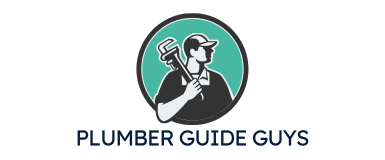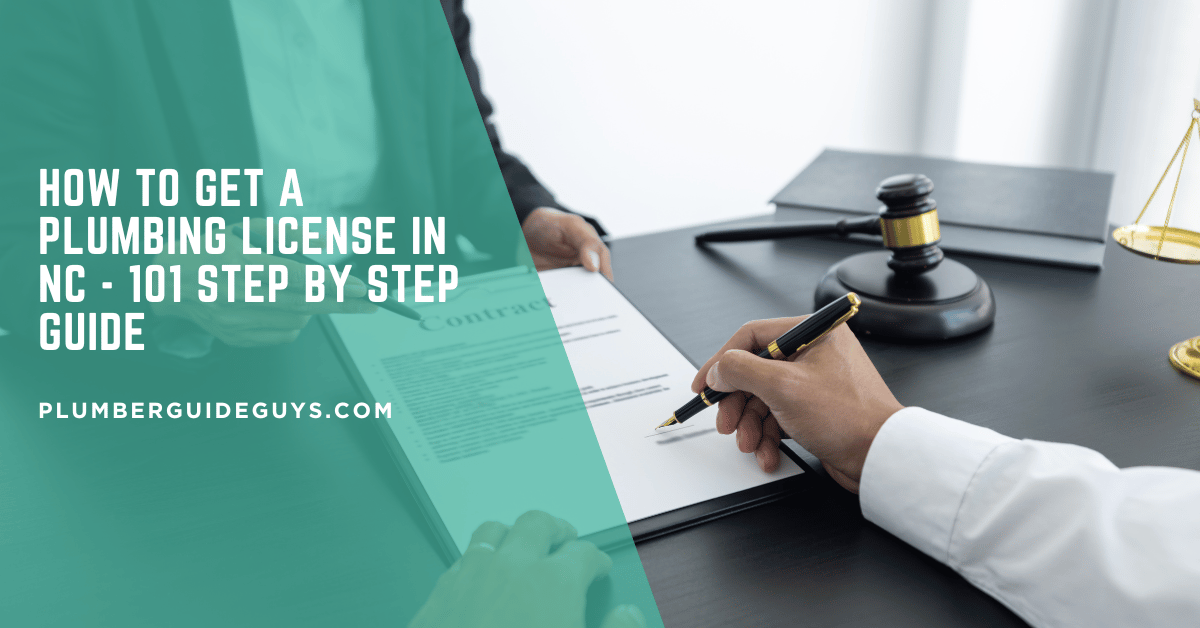Affiliate Disclosure
Plumber Guide Guys is a participant in the Amazon Services LLC Associates Program, an affiliate advertising program designed to provide a means for sites to earn advertising fees by advertising and linking to Amazon.
How to Get a Plumbing License in NC? Are you ready to unlock a rewarding career that goes beyond just fixing pipes? What if becoming a licensed plumber in North Carolina could be your gateway to a stable and lucrative profession?
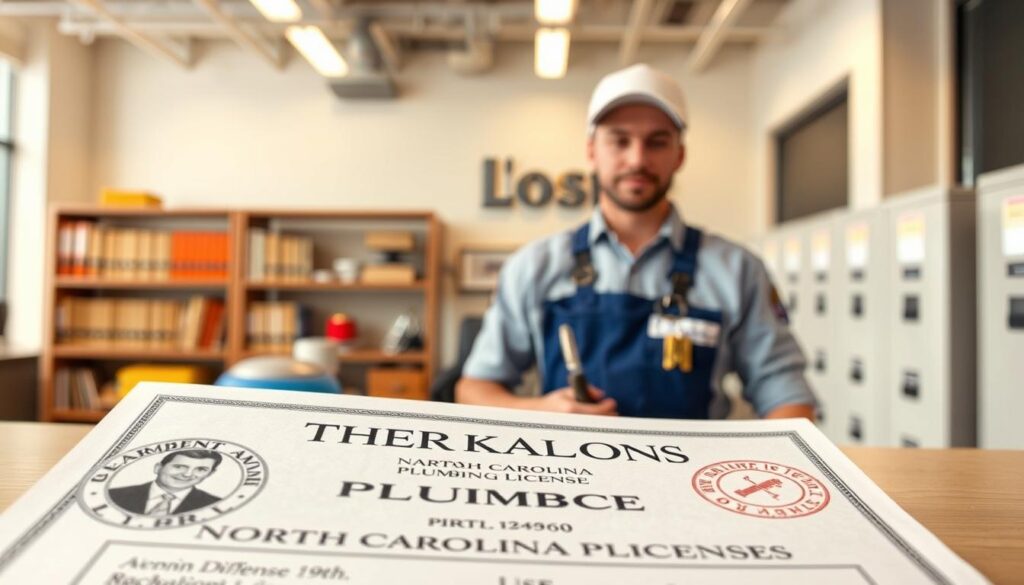
Plumbing is far more than simple repairs. When you pursue a plumbing license in North Carolina, you’re entering a technical field. It requires precision, knowledge of complex systems, and understanding of critical safety codes.
Getting your North Carolina plumbing license involves specific requirements. These protect both professionals and the public. From educational training to exams, each step prepares you to become a skilled, certified professional. You’ll learn to design, install, and maintain critical infrastructure.
This guide will walk you through everything you need to know about how to get a plumbing license in NC. We’ll break down the North Carolina plumbing license requirements into clear, manageable steps.
Key Takeaways
- Plumbing licenses in NC require specific educational and training paths
- Professional certification demonstrates technical expertise
- Licensing protects both professionals and consumers
- Multiple career opportunities exist for licensed plumbers
- Ongoing education is key for maintaining your license
Table of Contents
Understanding North Carolina Plumbing License Requirements
Getting a plumbing license in North Carolina might seem hard. But knowing what you need helps you plan your career. The state has clear rules for plumbing licenses to keep standards high.
North Carolina has many licenses for plumbers. This lets them start their careers in the trade.
Plumbing License Categories
There are different plumbing licenses in North Carolina. Each one is for a specific level of experience:
- P-I Contractor License
- P-II Contractor License
- Restricted Limited Plumbing (RLP) Contractor License
- Plumbing Technician Sublicense
Basic Eligibility Requirements
To get a plumbing license in North Carolina, you need to meet certain requirements:
- Be at least 18 years old
- Have a high school diploma or similar
- Show you have experience in plumbing
- Have a clean criminal record
Documentation Needed
| Document Type | Purpose |
|---|---|
| Proof of Age | Verify legal age requirement |
| Educational Certificates | Confirm educational background |
| Work Experience Records | Demonstrate professional competency |
| Criminal Background Check | Ensure professional integrity |
“Preparation is key to successfully navigating the North Carolina plumbing licensing process.” – NC State Licensing Board
Understanding these requirements is the first step toward building a successful plumbing career in North Carolina.
Educational Pathways for Aspiring Plumbers
Starting a plumbing career in North Carolina needs careful planning. You must choose the right educational path. This journey begins with understanding the different ways to become a plumber.
There are many ways to grow in plumbing in North Carolina. You can pick from several educational paths. These paths will get you ready for a fulfilling career in the trades:
- Vocational training programs
- Community college certificate courses
- Technical school diploma tracks
- Registered apprenticeship programs
A plumbing apprenticeship in North Carolina mixes hands-on training with classroom learning. These programs last four to five years. They give you practical skills and the knowledge you need.
Key benefits of these programs include:
- A structured learning environment
- Direct industry mentorship
- Potential earnings while training
- A clear path to professional certification
Community colleges in North Carolina have plumbing technology programs. These courses teach you important skills like pipe installation and blueprint reading. By picking the right path, you’ll lay a solid foundation for your plumbing career.
Investing in your education is the first step toward becoming a skilled professional in the plumbing industry.
Each educational route has its own benefits. Your choice should match your career goals, learning style, and personal situation.
How to Get a Plumbing License in NC
Getting a plumbing license in North Carolina might seem hard. But, with the right help, you can do it. Knowing what you need and the steps to take is key.
The North Carolina State Board of Examiners of Plumbing, Heating and Fire Sprinkler Contractors oversees the licensing. Being well-prepared will help you apply successfully.
Application Process Overview
Here’s what you need to do to become a licensed plumber:
- Fill out the official nc plumbing license application form
- Collect all needed documents
- Show proof of work experience
- Pass the required exams
Background Check Requirements
North Carolina requires a detailed background check for plumbing licenses. You must:
- Give fingerprints for a state criminal record check
- Undergo a national background investigation
- Share any past criminal history
Fee Structure and Payment Methods
Knowing the plumbing license fees in North Carolina is important for planning your costs.
| License Type | Application Fee | Examination Fee |
|---|---|---|
| Apprentice Plumber | $50 | $75 |
| Journeyman Plumber | $75 | $100 |
| Master Plumber | $100 | $150 |
You can pay with:
- Credit/Debit cards
- Electronic bank transfers
- Certified checks
- Money orders
Pro tip: Always check current fees with the North Carolina State Board. Rates can change.
Work Experience and Training Requirements
Getting the right work experience is key to getting your North Carolina plumbing license. The state has clear rules to make sure you have the hands-on skills needed to be a pro plumber.
To meet the North Carolina plumbing license needs, you must fulfill strict work experience rules. The state requires:
- At least 2 years (4,000 hours) of full-time on-site experience
- Experience must include installing, maintaining, servicing, or fixing plumbing systems
- Work can be done before licensure was needed
Your work experience records are very important. You’ll need to show detailed proof of your plumbing skills. Verifying experience from different states or military service is very important.
Qualifying work experience includes:
- Direct hands-on plumbing work
- Supervised practical training
- Detailed records of hours worked
Apprenticeship programs are a great way to get the needed experience. These programs offer structured training that counts toward your license. They also help you learn important skills.
Professional tip: Keep detailed records of your work experience, including dates, job descriptions, and supervisor contact info.
Some extra training certifications can also boost your application. They show your dedication to growing in the plumbing field.
North Carolina Plumbing License Examination Process
Getting ready for the nc state plumbing board examination needs careful planning. You must understand the testing process well. This exam is key for those wanting to become certified plumbers in North Carolina.
The exam checks your technical skills and knowledge. You need to show you know a lot about plumbing systems, safety, and rules.
Exam Structure and Content
Your test will cover important plumbing areas:
- Plumbing codes and regulations
- Technical installation procedures
- Safety standards
- Mathematical calculations
- Diagnostic and repair techniques
Study Resources and Materials
Good preparation means using the right study materials. Here are some top picks:
- Official North Carolina plumbing code manuals
- Practice examination workbooks
- Online training modules
- Professional workshops
Testing Locations and Scheduling
The nc state plumbing board examination is held in seven places:
- Asheville
- Charlotte
- Winston-Salem
- Raleigh
- Fayetteville
- Greenville
- Wilmington
Book your test on the North Carolina Plumbing Board’s official website. Pick a location that’s easy for you to get to. Register early to choose your best date and time.
License Activation and Renewal Procedures
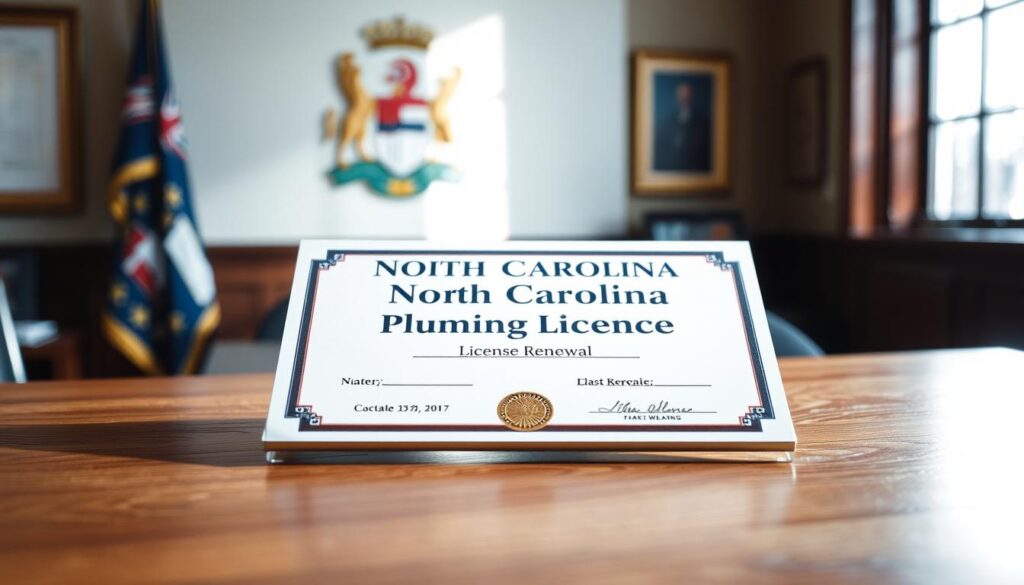
After passing your plumbing license exam, you must take several important steps. These steps help activate and keep your professional credentials valid. The renewal process in North Carolina has specific rules and deadlines you need to follow.
New plumbers have 45 days to send in their License Activation Form after passing the exam. If you miss this deadline, you might have to retake the exam. This could slow down your start in the plumbing field. The North Carolina Board of Examiners has detailed instructions for this step.
- Submit License Activation Form within 45 days
- Pay required activation fees
- Maintain current contact information
- Complete mandatory continuing education
Your plumbing license in North Carolina is good for one year. You’ll get a renewal notice about 60 days before it expires. Here’s what you need to do:
- Renew online through the official portal
- Pay the renewal fee
- Print your own license certificate
- Update personal information if necessary
Pro tip: Keep track of your expiration date to avoid late renewal penalties, which can include an additional $25 administrative fee.
If you lose your license, you can get a duplicate for $15. Always stay on top of your renewal needs to keep your professional status strong.
Career Opportunities and Salary Expectations
Getting a plumbing license in NC opens up a world of career possibilities. The plumbing field has many paths for those with the right skills and licenses.
In North Carolina, plumbers have many career paths to explore. Your license can lead to jobs in different sectors and income sources.
Entry-Level Positions
Starting with a plumbing license in NC, you’ll find entry-level jobs like:
- Apprentice plumber
- Residential service technician
- Commercial maintenance plumber
- Construction site plumbing assistant
Advanced Career Paths
With more experience, you can move to advanced roles like:
- Master plumber
- Plumbing inspector
- Project manager
- Independent contractor
- Plumbing business owner
Salary Ranges by Experience Level
Plumbers in North Carolina earn different salaries based on experience and specialty. The U.S. Bureau of Labor Statistics reports the following salary ranges:
| Experience Level | Annual Salary Range |
|---|---|
| Entry-Level | $35,000 – $45,000 |
| Mid-Career | $45,000 – $65,000 |
| Experienced/Specialized | $65,000 – $85,000 |
Pro tip: Keep improving your skills and getting more certifications to increase your earnings in plumbing.
State-Approved Training Programs and Schools
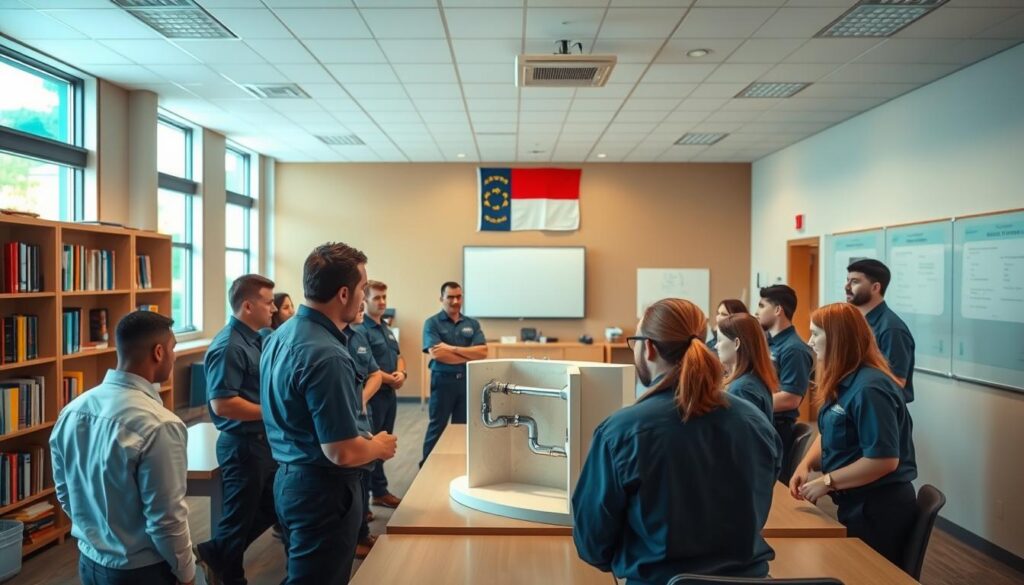
Getting plumbing certification in North Carolina means picking the right school. The state has many top schools for plumbing training.
Community colleges in North Carolina offer great plumbing courses. They mix theory with hands-on skills needed for plumbing jobs.
- Fayetteville Technical Community College offers:
- Diploma program in plumbing
- Certificate program in plumbing
- Guilford Technical Community College provides:
- 14-credit certificate program
- Forsyth Tech Community College features:
- Three-semester, 39-credit-hour diploma program
- Two-semester, 18-credit-hour certificate program
When picking a plumbing program in North Carolina, look at the curriculum, hands-on training, and if it meets state rules. Each program has its own benefits for starting a plumbing career.
Many schools offer financial help, making certification more affordable. Contact the school’s admissions to find out about scholarships and grants for your education.
Invest in your future by selecting a state-approved plumbing training program that matches your career goals and learning style.
Professional Associations and Resources
Getting through the nc plumbing contractor licensing process is easier with professional associations and resources. These groups offer great support for plumbers at all stages of their careers.
Being part of professional organizations can really boost your plumbing career. The North Carolina Association of Plumbing-Heating-Cooling Contractors (NCAPHCC) is a big help for professionals.
- Networking opportunities with experienced plumbing professionals
- Access to continuing education resources
- Industry updates and regulatory information
- Professional development workshops
Here are some key associations for NC plumbing contractors:
| Association | Key Benefits | Membership Type |
|---|---|---|
| NCAPHCC | State-specific training | Professional |
| Plumbing-Heating-Cooling Contractors Association (PHCC) | National networking | National |
| Local Trade Groups | Community connections | Regional |
Online resources can also help with your nc plumbing contractor licensing process. Check out industry publications, webinars, and forums to keep up with new tech and rules.
Pro tip: Don’t miss out on local industry events and conferences. They’re great for growing your network and learning about new plumbing trends and licensing rules.
Conclusion
Becoming a licensed plumber in North Carolina takes hard work and careful planning. Your path to getting a plumbing license in NC includes many key steps. These include finishing your education, getting practical experience, and passing state exams.
The journey to get a plumbing license in NC asks for a big commitment to your career. You’ll need to spend time in training, get real-world experience, and study hard for exams. Each step is a big achievement in your plumbing career.
The plumbing industry in North Carolina is full of chances for skilled workers. By following the steps, keeping your skills up to date, and staying current with industry standards, you can build a strong and fulfilling career. Your success will come from always learning, being technically skilled, and loving the challenge of solving problems.
Getting your plumbing license is more than just passing tests. It’s about becoming a reliable professional who adds value to your community. Stay focused, keep your goals in mind, and enjoy the journey to becoming a licensed plumber in North Carolina.
FAQ
How long does it take to get a plumbing license in North Carolina?
What are the minimum age requirements for a plumbing license in NC?
How much does it cost to get a plumbing license in North Carolina?
How long does it take to get a plumbing license in North Carolina?
What are the minimum age requirements for a plumbing license in NC?
How much does it cost to get a plumbing license in North Carolina?
FAQ
How long does it take to get a plumbing license in North Carolina?
Getting a plumbing license in North Carolina takes time. It usually takes 4-5 years. This includes finishing your education, getting work experience, and passing the state exam.
What are the minimum age requirements for a plumbing license in NC?
You must be 18 to apply for a plumbing license in North Carolina. Some programs start at 16, but you need to be 18 to get fully licensed.
How much does it cost to get a plumbing license in North Carolina?
The cost varies. It includes fees for apprenticeships, exams, and the license itself. Costs range from
FAQ
How long does it take to get a plumbing license in North Carolina?
Getting a plumbing license in North Carolina takes time. It usually takes 4-5 years. This includes finishing your education, getting work experience, and passing the state exam.
What are the minimum age requirements for a plumbing license in NC?
You must be 18 to apply for a plumbing license in North Carolina. Some programs start at 16, but you need to be 18 to get fully licensed.
How much does it cost to get a plumbing license in North Carolina?
The cost varies. It includes fees for apprenticeships, exams, and the license itself. Costs range from $1,500 to $6,000, depending on your path.
Do I need to complete an apprenticeship to become a licensed plumber?
Yes, North Carolina requires an apprenticeship. You need 8,000 hours of work experience or a 4-year apprenticeship to qualify.
What types of plumbing licenses are available in North Carolina?
North Carolina has several licenses. These include:
– P-I Limited Plumbing License
– P-II Plumbing Contractor License
– Residential Limited Plumbing (RLP) Contractor License
– Plumbing Technician Sublicense
How often do I need to renew my plumbing license in NC?
You need to renew your license every two years. You’ll need to complete continuing education and pay a fee.
What subjects are covered in the NC plumbing license exam?
The exam covers many topics. These include plumbing codes, safety, installation, and more. It also includes math related to plumbing.
Can I transfer my plumbing license from another state?
North Carolina might accept your out-of-state license. You’ll need to provide proof of licensure, work experience, and pass a specific exam.
What are the educational requirements for a plumbing license?
You need a high school diploma or GED. You also need to complete a vocational program or apprenticeship. Work experience under a licensed plumber is required.
Are there any physical requirements for becoming a plumber in NC?
Plumbing is a demanding job. You should be able to lift heavy items, work in tight spaces, and stand for long periods. Good manual dexterity and stamina are also important.
,500 to ,000, depending on your path.
Do I need to complete an apprenticeship to become a licensed plumber?
Yes, North Carolina requires an apprenticeship. You need 8,000 hours of work experience or a 4-year apprenticeship to qualify.
What types of plumbing licenses are available in North Carolina?
North Carolina has several licenses. These include:
– P-I Limited Plumbing License
– P-II Plumbing Contractor License
– Residential Limited Plumbing (RLP) Contractor License
– Plumbing Technician Sublicense
How often do I need to renew my plumbing license in NC?
You need to renew your license every two years. You’ll need to complete continuing education and pay a fee.
What subjects are covered in the NC plumbing license exam?
The exam covers many topics. These include plumbing codes, safety, installation, and more. It also includes math related to plumbing.
Can I transfer my plumbing license from another state?
North Carolina might accept your out-of-state license. You’ll need to provide proof of licensure, work experience, and pass a specific exam.
What are the educational requirements for a plumbing license?
You need a high school diploma or GED. You also need to complete a vocational program or apprenticeship. Work experience under a licensed plumber is required.
Are there any physical requirements for becoming a plumber in NC?
Plumbing is a demanding job. You should be able to lift heavy items, work in tight spaces, and stand for long periods. Good manual dexterity and stamina are also important.
